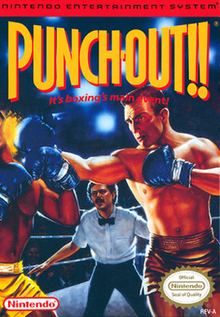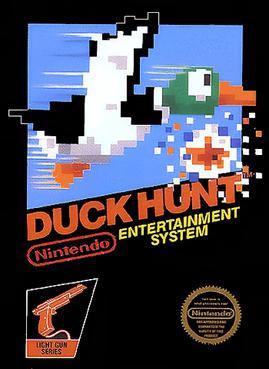
Duck Hunt is a 1984 light gun shooter video game developed and published by Nintendo for the Nintendo Entertainment System (NES). The game was first released in April 1984 in Japan for the Family Computer (Famicom) console and in North America as an arcade game for the Nintendo VS. System. It became a launch game for the NES in North America in October 1985, and was re-released in Europe two years later.

Michael Gerard Tyson is an American professional boxer who competed from 1985 to 2005, and is scheduled to compete once again in 2024. Nicknamed "Iron Mike" and "Kid Dynamite" in his early career, and later known as "the Baddest Man on the Planet", Tyson is regarded as one of the greatest heavyweight boxers of all time. He reigned as the undisputed world heavyweight champion from 1987 to 1990. Tyson won his first 19 professional fights by knockout, 12 of them in the first round. Claiming his first belt at 20 years, 4 months, and 22 days old, Tyson holds the record as the youngest boxer ever to win a heavyweight title. He was the first heavyweight boxer to simultaneously hold the WBA, WBC and IBF titles, as well as the only heavyweight to unify them in succession. The following year, Tyson became the lineal champion when he knocked out Michael Spinks in 91 seconds of the first round. In 1990, Tyson was knocked out by underdog Buster Douglas in one of the biggest upsets in boxing history.

Excitebike is a motocross racing video game developed and published by Nintendo. In Japan, it was released for the Famicom in 1984 and then ported to arcades as VS. Excitebike for the Nintendo VS. System later that year. In North America, it was initially released for arcades in 1985 and then as a launch game for the Nintendo Entertainment System later that year, becoming one of the best-selling games on the console. It is the first game in the Excite series.

Punch-Out!! is a 1984 arcade boxing video game developed by Nintendo R&D3 and published by Nintendo. It was the inaugural game in the Punch-Out!! series.
1988 saw many sequels and prequels in video games, such as Dragon Quest III, Super Contra, Super Mario Bros. 2, Mega Man 2, Double Dragon II: The Revenge, and Super Mario Bros. 3, along with new titles such as Assault, Altered Beast, Capcom Bowling, Ninja Gaiden, RoboCop, Winning Run and Chase H.Q.
1987 saw many sequels and prequels in video games, such as Castlevania II: Simon's Quest, Dragon Quest II, Final Lap, and Zelda II, along with new titles such as After Burner, Contra, Double Dragon, Final Fantasy, Mega Man, Metal Gear, Operation Wolf, Phantasy Star, Shinobi, Street Fighter and The Last Ninja. The Legend of Zelda was also introduced outside of Japan.

Urban Champion (アーバンチャンピオン) is a fighting video game developed and published by Nintendo in 1984. It was first released for the Famicom and Nintendo VS. System for arcades in 1984, and later released for the Nintendo Entertainment System in North America and Europe in 1986. It is Nintendo's first 2D fighting game, eventually followed by the 1993 Famicom game Joy Mech Fight. The game was poorly received, and has been retroactively regarded as one of the weaker Nintendo-published games for the NES.
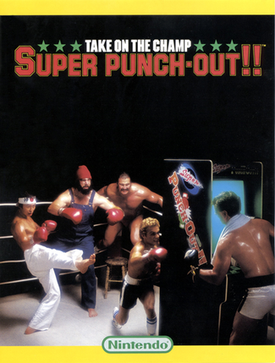
Super Punch-Out!! is a 1984 arcade boxing game by Nintendo. The sequel to Punch-Out!!, it follows the same format while adding several new features and characters. Along with punching, blocking and dodging, players also have the ability to duck. The game also saves and displays the three fastest knockout times, while the game's difficulty is increased.
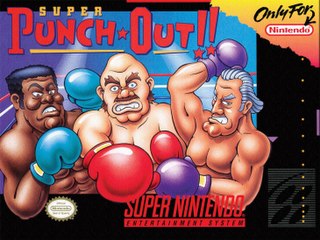
Super Punch-Out!! is a boxing video game developed and published by Nintendo for the Super Nintendo Entertainment System (SNES). It was released on October 24, 1994 in North America and again in the same region in 1996. It was released in the United Kingdom on February 10, 1995 for the same console and in Japan in 1998 for the Super Famicom through the Nintendo Power flash RAM cartridge series. The game is also included in the GameCube version of Fight Night Round 2 as an extra game due to the inclusion of Little Mac in the game. The game was released for the Wii's Virtual Console in Europe on March 20, 2009, in North America on March 30, 2009, and in Japan on July 7, 2009. The game was also released on the New Nintendo 3DS eShop on May 5, 2016. Nintendo re-released Super Punch-Out!! in the United States in September 2017 as part of the company's Super NES Classic Edition. It is the fourth game in the Punch-Out!! series, taking place after the Punch-Out!! game for the Nintendo Entertainment System (NES).
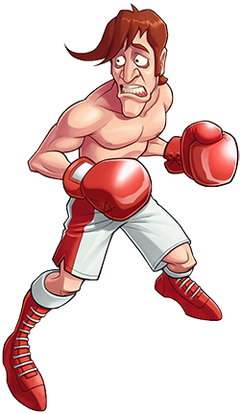
Glass Joe is a fictional French boxer from Nintendo's Punch-Out!! video game series. He first appeared in the arcade game Punch-Out!! in 1984 and three years later in the NES game of the same name. His most recent appearance was in the Wii installment of Punch-Out!!. He was originally designed by Shigeru Miyamoto and was revised by Makoto Wada for the NES game. He is voiced by Christian Bernard in the Wii game.

King Hippo is a fictional boxer from Nintendo's Punch-Out!! series. King Hippo first appeared on the Nintendo Entertainment System game Mike Tyson's Punch-Out!!, as the second competitor in the Major Circuit. Subsequent reviews have characterized King Hippo as one of the most iconic characters from the game, because he was a complicated boss to defeat. In the Wii Punch-Out!!, King Hippo returns, having a second fight where he uses a manhole to protect his weak point.
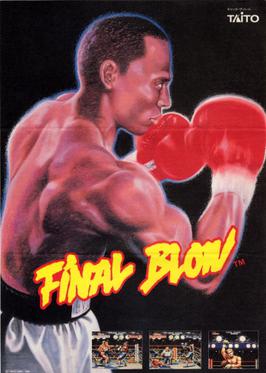
Final Blow is a boxing arcade video game released in 1988 by Taito. The name remained the same for all ported platforms, except for the Sega versions, which Sega released outside Japan as James 'Buster' Douglas Knockout Boxing featuring Buster Douglas himself in 1990 immediately after his upset victory over Mike Tyson.

Power Punch II is a boxing video game developed by Beam Software for the Nintendo Entertainment System (NES) and originally released in North America in June 1992. The game puts the player in the role of Mark Tyler, an undefeated heavyweight champion on Earth who is invited by an outerspace boxing federation to fight the toughest challengers in the universe. Gameplay consists of the player battling each computer-controlled opponent in up to three one-minute rounds and a scoring system based on the player's performance. Training sessions between opponents allow the player to improve stats prior to an upcoming bout.

Mike Tyson is an American former World Heavyweight boxing Champion. Tyson, ranked by ESPN as the No. 1 Most Outrageous Character in modern sports history has appeared in numerous popular media in either cameo appearances or as a subject of parody or satire.

Little Mac is a fictional boxer and the protagonist in Nintendo's Punch-Out!! series of video games. He first appeared as a nameless boxer in the Arcade game Punch-Out!!, then was given a name and redesigned in the NES game of the same name. He is the smallest and youngest of all the boxers in the games, being only 17 years old across all Punch-Out!! games. His signature attack is the "STAR Punch". His design was changed again for the SNES Super Punch-Out!!, but reverted to his NES appearance in the Wii title, wich was then used in the Super Smash Bros. series. In the NES and Wii games, Little Mac is accompanied by Doc Louis, his trainer.

Punch-Out!! is a boxing video game series created by Genyo Takeda and Makoto Wada, and published by Nintendo. The player controls a boxer named Little Mac, who aims to become the World Video Boxing Association (W.V.B.A.) champion.
Punch-Out!! is a series of boxing video games created by Genyo Takeda and Makoto Wada, and published by Nintendo. The main protagonist and player character of the series is Little Mac, a short boxer from the Bronx who climbs the ranks of the fictional World Video Boxing Association (WVBA) by challenging various opponents. These opponents come from different countries and feature various ethnic stereotypes associated with their place of origin.

Punch-Out!! is a 2009 boxing video game developed by Next Level Games and published by Nintendo for the Wii. It is the fifth and most recent mainline game in the Punch-Out!! series, following the SNES version of Super Punch-Out!!, and is a reboot of the series.

Mike Tyson Boxing, known in the UK as Prince Naseem Boxing, is a video game developed and published by Codemasters for PlayStation in 2000, and developed by Virtucraft and published by Ubi Soft for Game Boy Advance in 2002.
